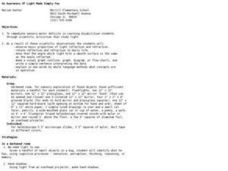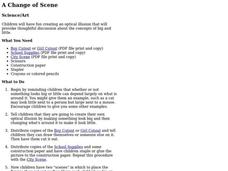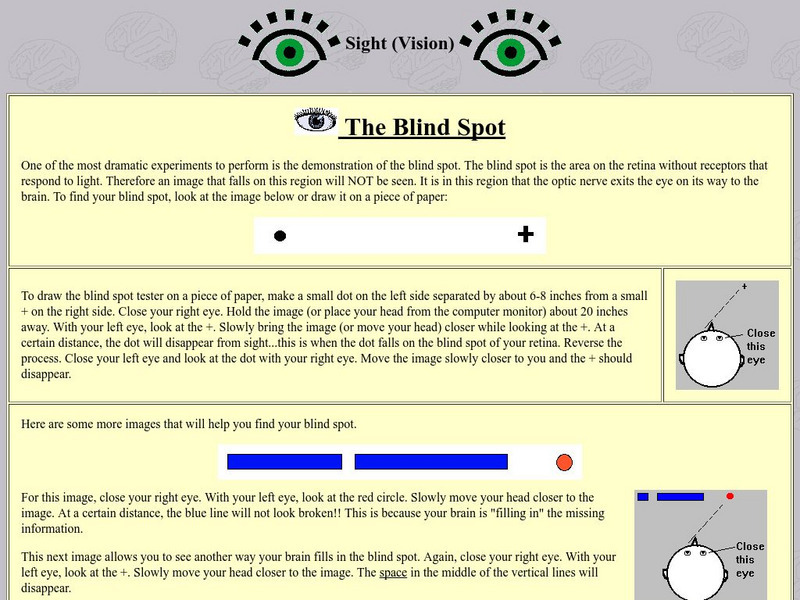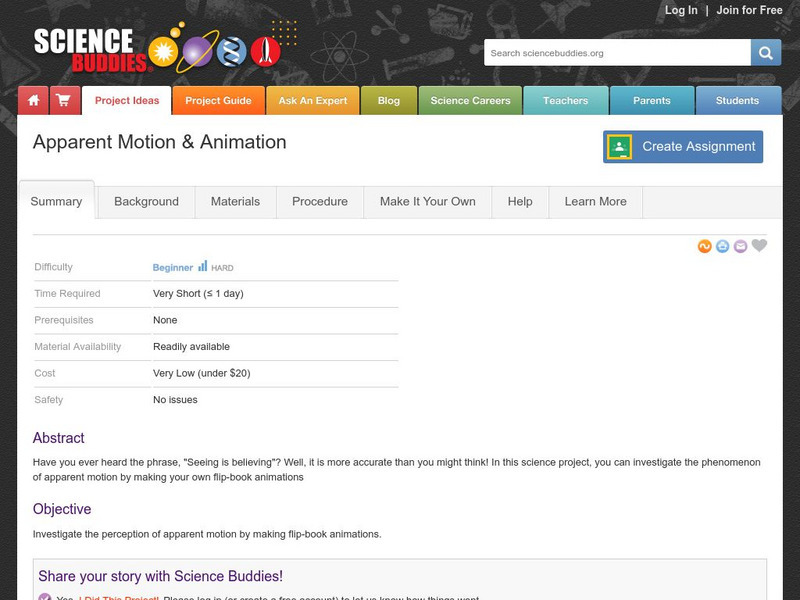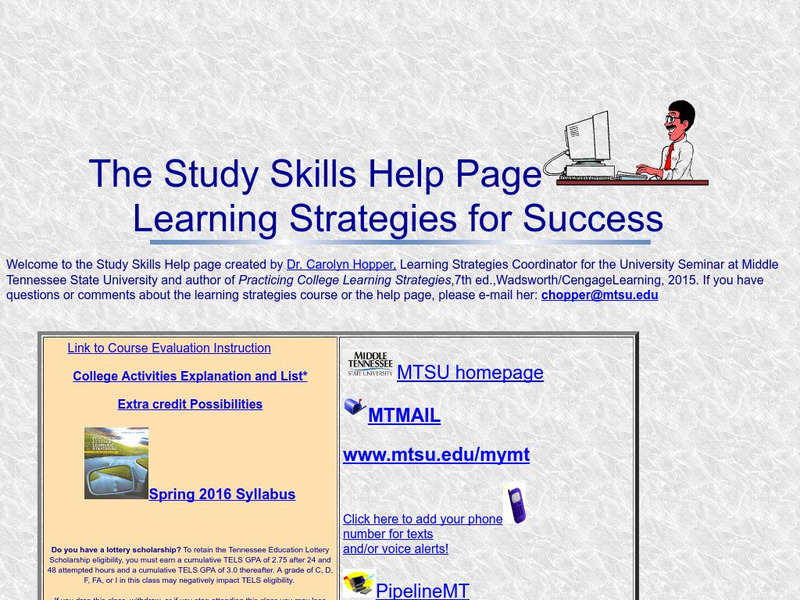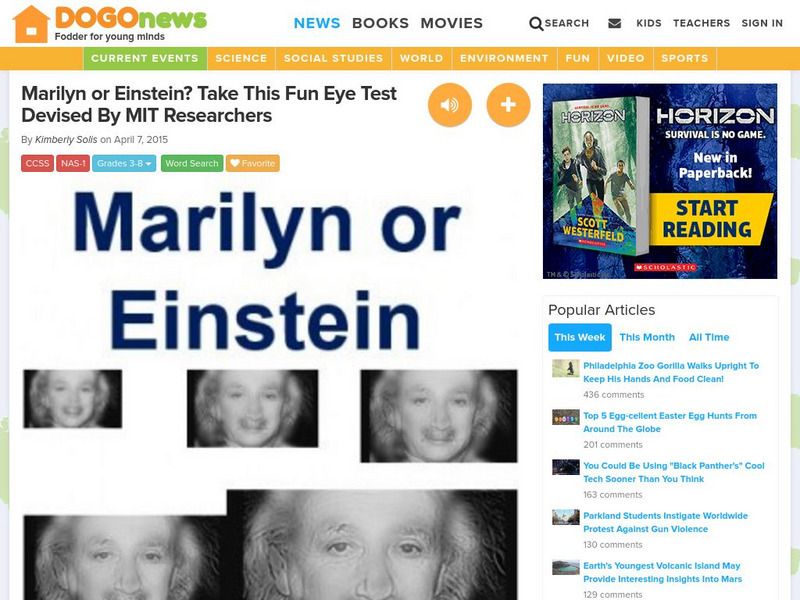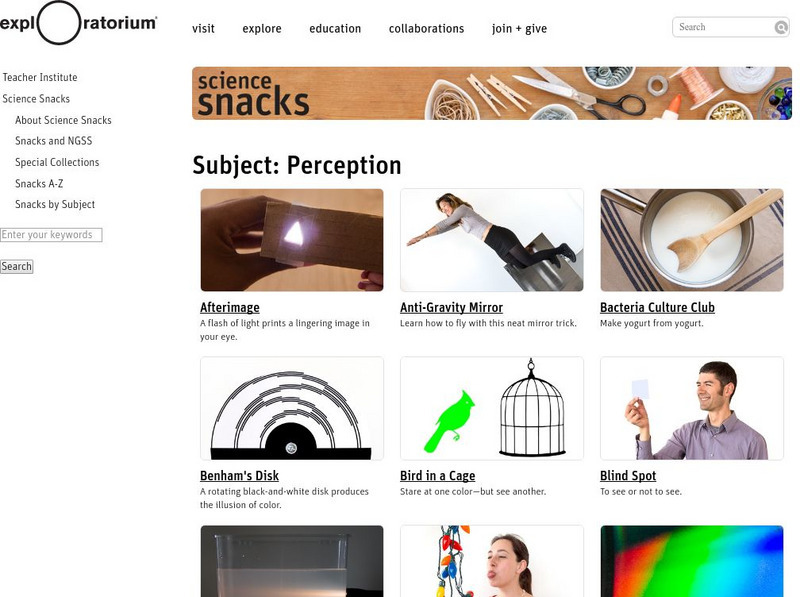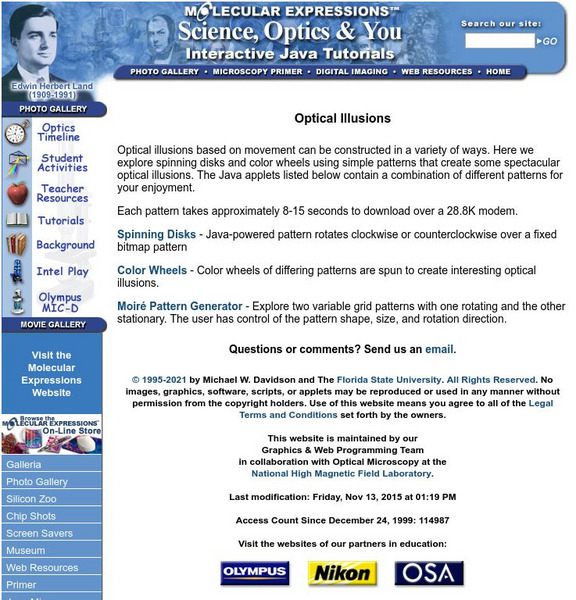Curated OER
Optical Illusions
Students view, identify, and construct four optical illusions. In this optical illusions lesson, students are introduced to four types of optical illusions. They construct their own illusions.
Curated OER
An Awareness of Light Made Simply Fun
Learners with sensory perception issues discover the properties of light through a series of excellent hands on activities. They look at beams of lights in a darkened room; use a kaleidoscope and optical illusions as they experience the...
Curated OER
What is Retrograde Motion
In this retrograde motion instructional activity, learners draw a diagram of the night sky by connecting dots to show retrograde motion. They compare retrograde motion to an optical illusion and answer questions about both.
Curated OER
Op Art and Contrast
Seventh graders explore the Op art movement and the work of artists Bridget Riley, Victor Vasarely and MC Escher. the principles of contrast and how it can be used to create optical illusions is examined in this lesson.
Curated OER
A Change of Scene
Pupils are challenged to create optical illusions using using cut-outs. The activity provokes thoughtful discussion about scale.
Curated OER
A Change of Scene
Students create their own optical illusions by making something look big and then changing what's around it to make it look little.
University of Washington
Neuroscience for Kids: Vision and Optical Illusions
Wow! A great page full of different experiments to illustrate the phenomena of optical illusions, and then it explains what is happening!
TED Talks
Ted: Ted Ed: How Optical Illusions Trick Your Brain
Optical illusions are images that seem to trick our minds into seeing something different from what they actually are. But how do they work? This learning module walks us through a few common optical illusions and explains what these...
Science Buddies
Science Buddies: Apparent Motion & Animation
This project investigates the phenomenon of apparent motion by making your own flip-book animations. This optical illusion experiment, while fun and short, will prove to be a very eye opening experience.
Exploratorium
Exploratorium: Optical Illusions
Try these great optical illusions yourself, and read the explanation of how your brain fools your eyes. You will need Shockwave to run these properly.
Other
Ritsumeikan University: Akiyoshi's Illusion Pages
A large collection of visual illusions and anomalous motion illusions. The latter can potentially make a person feel dizzy and should be viewed or shared with caution.
Other
Tennessee State University: The Study Skills Help Page
The Study Skills Help Page provides learning strategies for success. Explore the learning tools and tips that you can use to become a more skilled learner.
Other
Kodak: Airborne
Beautiful, almost unrealistic, dance photography by Lois Greenfield. Her black and white prints are phenomenal! Lois reveals her secrets and techniques.
Canada Science and Technology Museum
Canada Science and Technology Museum: Background Information for Light
Light! How do we see? What makes light? Find out everything you need to know through the Q&As on this site.
DOGO Media
Dogo News: Marilyn or Einstein?
Learn about and try out a fun optical illustion created by MIT in 2007 that also serves as a vision test. Includes video.
Exploratorium
Exploratorium: Science Snacks: Perception
Try one of these 33 perception activities in your classroom.
Sophia Learning
Sophia: Bill Nye: Once in a Mega Moon
Bill Nye explains why the moon appears smaller when it is higher in the sky, and he presents a Home Demo experiment that proves its an illusion. The experiment requires a bright moon on a clear night, a stiff piece of cardboard, and a...
Optical Society
Optical Society of America: Exploring the Science of Light: Optical Illusions
Explains what optical illusions are and offers many examples to try.
Alabama Learning Exchange
Alex: Perfect Perception? (Perception and Illusion)
In this lesson, students discuss and explore perception and illusions. Websites are provided showing various optical illusions. Students are asked to journal about illusions, recreate illusions, and create their own flip-book.
American Museum of Natural History
American Museum of Natural History: Optical Illusions and How They Work
What you see and what you think you see are different things. Find out what your brain doing behind-the-scenes!
Florida State University
Florida State University: Optical Illusions
A brief informative site on optical illusions. Includes some beautiful examples of optical illusions such as spinning disks, color wheels, and Moire Pattern Generators.
George Eastman Museum
George Eastman House: Create a Thaumatrope
Simple but amazing! Learn how to make a thaumatrope, one of the earliest forms of cinematography. Watch as two images become one right before your eyes.
George Eastman Museum
George Eastman House: Create a Zoetrope
A zoetrope, or the "wheel of life," is an early way motion pictures were made. With these easy to follow directions you can create one of your very own using the printable templates.
PBS
Pbs Teachers: Growing Up Different: Familiar Faces
Explore the handicap of autism and the inability to recognize faces. Create a mixed-up face with the mouth and eyes flipped upside down and conduct a survey of how five people are able to describe the expression on the face.



